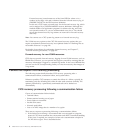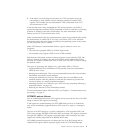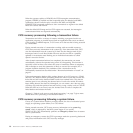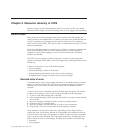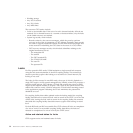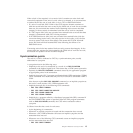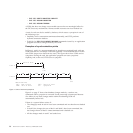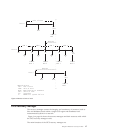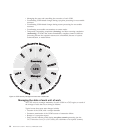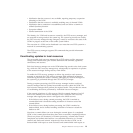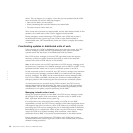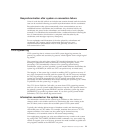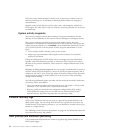
– EXEC CICS CREATE CONNECTION COMPLETE
– EXEC CICS DISCARD CONNECTION
– EXEC CICS DISCARD TERMINAL
A UOW that does not change a recoverable resource has no meaningful effect for
the CICS recovery mechanisms. Nonrecoverable resources are never backed out.
A unit of work can also be ended by backout, which causes a syncpoint in one of
the following ways:
v Implicitly when a transaction terminates abnormally, and CICS performs
dynamic transaction backout
v Explicitly by EXEC CICS SYNCPOINT ROLLBACK commands issued by an application
program to backout changes made by the UOW.
Examples of synchronization points
In Figure 1, task A is a nonconversational (or pseudoconversational) task with one
UOW, and task B is a multiple UOW task (typically a conversational task in which
each UOW accepts new data from the user). The figure shows how UOWs end at
syncpoints. During the task, the application program can issue syncpoints
explicitly, and, at the end, CICS issues a syncpoint.
Figure 2 on page 17 shows that database changes made by a task are not
committed until a syncpoint is executed. If task processing is interrupted because
of a failure of any kind, changes made within the abending UOW are
automatically backed out.
If there is a system failure at time X:
v The change(s) made in task A have been committed and are therefore not backed
out.
v In task B, the changes shown as Mod 1 and Mod 2 have been committed, but
the change shown as Mod 3 is not committed and is backed out.
v All the changes made in task C are backed out.
Unit of work
Task A
SOT EOT
(SP)
UOW UOW UOW UOW
Task B
SOT SP SP SP EOT
(SP)
Abbreviations:
EOT: End of task SOT: Start of task
UOW: Unit of work SP: Syncpoint
Figure 1. Units of work and syncpoints
16 CICS TS for z/OS 4.1: Recovery and Restart Guide



